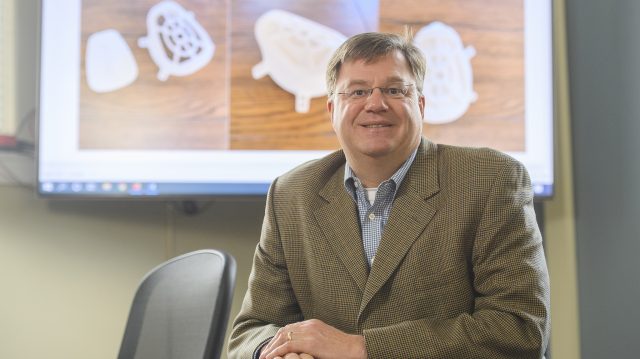
Troy Drewry, professor of practice in biomedical engineering and operations manager of the Center for Diagnostics, Design, Devices and Biomechanics, sits in front of photos of prototypes of the Ole Miss mask. Photo by Thomas Graning/Ole Miss Digital Imaging Services
When the Ole Miss mask – a newly designed form of personal protective equipment in development at the University of Mississippi’s Center for Diagnostics, Design, Devices and Biomechanics (CD3B) – reaches the masses, Troy D. Drewry will be among those smiling the widest.
A new faculty member in the UM Department of Biomedical Engineering, Drewry is the operations manager for the center. He, along with Chip Wade, research assistant professor of biomedical engineering and co-director of the center, developed the mask last spring during the first surge of the COVID-19 pandemic.
Drewry enlisted the help of his longtime friend, Jim Duncan, CEO of Remedy Medical in Hernando, to rapidly produce several iterations of the mask design and 3D-printed rapid prototypes.
The mask is made of polyurethane, similar to swimming goggles. The filter is thin, resembling the small pads inside of makeup products. Drewry, Wade and their collaborators seek to make the mask affordable and safe (certified by the National Institute for Occupational Safety and Health), and to design the mask to incorporate an off-the-shelf NIOSH and American National Standards Institute-approved filter.
“Knowing that my designs and inventions have gone into medical devices that have improved the quality of life for patients around the world is the most meaningful to me,” said the Lafayette, Louisiana, native who joined UM’s program in August 2019 as a professor of practice. He has had a successful career in the field of orthopedic medical devices and is the named inventor of over 60 U.S. patents for medical device technology.
Once mass produced, the masks will be given to health care workers and facilities for free. The general public will be able to purchase them at a low cost.
Drewry teaches Introduction to Biomedical Engineering, Senior Design I and Senior Design II.
“My biggest reward as a professor of practice is giving back to my students and sharing with them all I have learned and experienced in my 25-plus years in the medical device industry,” Drewry said. “It has also been tremendously rewarding to join the biomedical engineering team shortly after inception of the department and having the ability to make an impact and have a voice in the direction of the program.”
Drewry is a welcome addition to the department, said Dwight Waddell, chair and associate professor of biomedical engineering.
“Mr. Drewry is one of the foremost names in the area of medical technology development,” Waddell said. “His ample professional experience, ongoing research and dedication to teaching is helping shape the next generation of biomedical engineers.”
Drewry earned his bachelor’s degree in mechanical engineering from the University of Southwestern Louisiana in his hometown. He also holds two master’s degrees, one in biomedical engineering from the University of Memphis and another in engineering management from Christian Brothers University.
As a professor, Drewry said his goal is to try to customize his teaching to make sure he reaches as many students as possible.
“I am not as concerned about the grades as I am about the students ‘getting it,’” he said. “I spend a lot of time one-on-one with my students to ensure that is the case, and I think that is appreciated.”
When it comes to application, Drewry strongly believes in “real-world, hands-on” problem solving.
“I have been blessed to experience a lot in my industry career, and it allows me to share that with the students,” he said. “Most students throughout their formal education are so used to being given a problem and putting the single, right answer in a box at the bottom of the page. In my classes, they learn for the first time that their job is to identify and create the problem statement before solving and that there are often multiple ‘right’ answers to the problem, each with their own pros and cons.”
Drewry’s short-term goals include completing renovations to Brevard Hall and Insight Park, which will house the Department of Biomedical Engineering and CD3B, and refining his course offerings to take advantage of new facilities and equipment to which the students will have access.
“Long term, I want to create great biomedical engineering students that are ready for industry jobs, graduate school or medical school, whichever they choose,” Drewry said. “I also want to help to create a unique medical technology innovation environment for our students and faculty, innovate and commercialize medical technologies and create companies and Mississippi jobs around these technologies.”
The pieces are coming together on the new BME department facilities and equipment along with CD3B at Insight Park. The center connects science, medicine and engineering to advance the development of modern medical technology and devices, as well as new surgical approaches and practices.
“Once we have our facilities up and running, it will be time to roll up our sleeves and execute,” Drewry said. “We are starting to share our mission and vision with others outside the university, and it has been very well received and the Oxford-North Mississippi-Delta regions are ripe for what we are going to accomplish.”
Drewry and his wife, Rachel, have four children: Mary Frances, an Ole Miss engineering graduate; Emily, who attended Ole Miss, majoring in elementary education before completing her degree at the University of Memphis; Luke, a junior mechanical engineering major at Ole Miss; and Grace, a fourth-grader at St. Louis Catholic School in Memphis.
“We’ve been blessed to have a close family and spend a lot of time together,” Drewry said. “I enjoy hunting, fishing, cooking and reading.”